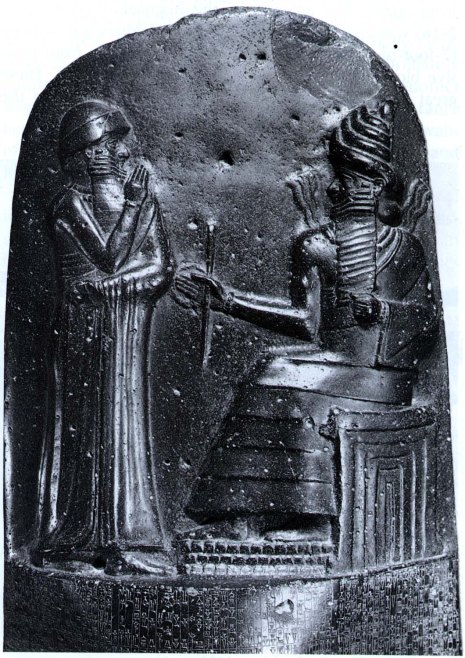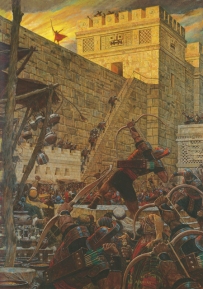I’ve spent the past month thinking. Thinking about my life, my family, and the world around us. I’ve watched the news as they “report” on the presidential candidates. I’ve listened to the accounts surrounding protests in the name of oppression. I’ve read the stories of people who demand change because of an offense. As this has happened, I’ve grown increasingly unsettled. I’ve sought (and found) comfort in the words of the prophets found in the scriptures.
As I’ve spent time pondering the Word of God, it became increasingly clear to me that, every day, we are moving further from God and closer to secularism. We are losing (or have already lost) Reverence for the Sacred.
Why are we turning our back on the Sacred? It is because the “love of many [has waxed] cold” (Matthew 24:12). We, as a society, have forgotten what our society is founded upon. Since the beginning of civilized history, man has been organized into communities. These communities have included everything from hunter-gatherers to Empire-builders. The one common theme is a basis of law. Man has for millennia used some sort of religious beliefs as the basis of their foundational laws.
One of the earliest examples of a written law is Hammurabi’s Code written between 1792-1752 BC. In the prologue to the Code, Hammurabi describes himself as an “exalted prince, who feared God” and wrote that he wanted to “to bring about the rule of righteousness in the land, to destroy the wicked and the evil-doers; so that the strong should not harm the weak” (US History). He may not have understood the concept of God the same way I do, but he clearly understood the concept of a Power Higher than himself.
He even included a carving of himself receiving the Code from Shamash, the Babylonian god of justice, another indication of his belief in a Power Higher than himself. These laws didn’t spring forth from the breast of man, they were inspired by a Holy Being.

Let’s jump forward to the founding of the United States. I now quote from the Declaration of Independence:
When in the Course of human events, it becomes necessary for one people to dissolve the political bands which have connected them with another, and to assume among the powers of the earth, the separate and equal station to which the Laws of Nature and of Nature’s God entitle them, a decent respect to the opinions of mankind requires that they should declare the causes which impel them to the separation.
We hold these truths to be self-evident, that all men are created equal, that they are endowed by their Creator with certain unalienable Rights, that among these are Life, Liberty and the pursuit of Happiness.
Our Founding Fathers believed the the Laws of Nature and of Nature’s God entitled them to break away from the rule of Great Britain and to establish a new nation. They even outlined three of the inalienable Rights: Life, Liberty, and the Pursuit of Happiness.
I like that the Founding Fathers didn’t specify a particular religious faith as they declared their Independence–there was no need, it was enough to acknowledge the Hand of God in the establishment of a free society.
Here then is the Foundation upon a Free Society must be built:
We must have an understanding and acceptance that there is a Power Greater than man.
We must understand that:
- There is a time in the future when all men will answer for their actions, not to man upon the Earth, but to God in the Heavens.
- We will have no peace in the land until we bring back the Love of God to the hearts of men.
- We will have no justice in the land until we return to our laws a foundation of something Greater than ourselves.
- We will have no mercy in the land until we “ask not what our country can do for us, but what we can do for our country” (John F. Kennedy).

Let us have the courage of Samuel the Lamanite who stood on the walls of Zarahemla and preached repentance and a return to God (Helaman 16). As we do this, we do not have to stoop to the level of our foes and resort to violence, suppression, lies, and hate. Rather, we must proclaim our beliefs through love, respect, and service. I want to share an excerpt from John F. Kennedy’s Inaugural address. In this passage, he was referring to the struggle between Democracy and Communism, but if we look, there is a parallel we can draw to the struggles we see today in our own communities.
So let us begin anew — remembering on both sides that civility is not a sign of weakness, and sincerity is always subject to proof. Let us never negotiate out of fear, but let us never fear to negotiate.
Let both sides explore what problems unite us instead of belaboring those problems which divide us.
Let both sides, for the first time, formulate serious and precise proposals for the inspection and control of arms, and bring the absolute power to destroy other nations under the absolute control of all nations.
Let both sides seek to invoke the wonders of science instead of its terrors. Together let us explore the stars, conquer the deserts, eradicate disease, tap the ocean depths, and encourage the arts and commerce.
Let both sides unite to heed, in all corners of the earth, the command of Isaiah — to “undo the heavy burdens, and [to] let the oppressed go free” (Isaiah 58:6).
And, if a beachhead of cooperation may push back the jungle of suspicion, let both sides join in creating a new endeavor — not a new balance of power, but a new world of law — where the strong are just, and the weak secure, and the peace preserved.
All this will not be finished in the first one hundred days. Nor will it be finished in the first one thousand days; nor in the life of this Administration; nor even perhaps in our lifetime on this planet. But let us begin.
In your hands, my fellow citizens, more than mine, will rest the final success or failure of our course. Since this country was founded, each generation of Americans has been summoned to give testimony to its national loyalty. The graves of young Americans who answered the call to service surround the globe.
Now the trumpet summons us again — not as a call to bear arms, though arms we need — not as a call to battle, though embattled we are — but a call to bear the burden of a long twilight struggle, year in and year out, “rejoicing in hope; patient in tribulation,” a struggle against the common enemies of man: tyranny, poverty, disease, and war itself (Romans 12:12).
Can we forge against these enemies a grand and global alliance, North and South, East and West, that can assure a more fruitful life for all mankind? Will you join in that historic effort?
In the long history of the world, only a few generations have been granted the role of defending freedom in its hour of maximum danger. I do not shrink from this responsibility — I welcome it. I do not believe that any of us would exchange places with any other people or any other generation. The energy, the faith, the devotion which we bring to this endeavor will light our country and all who serve it. And the glow from that fire can truly light the world.
And so, my fellow Americans, ask not what your country can do for you, ask what you can do for your country.
My fellow citizens of the world, ask not what America will do for you, but what together we can do for the freedom of man.
Finally, whether you are citizens of America or citizens of the wold, ask of us here the same high standards of strength and sacrifice which we ask of you. With a good conscience our only sure reward, with history the final judge of our deeds, let us go forth to lead the land we love, asking His blessing and His help, but knowing that here on earth God’s work must truly be our own.
What can we do…where is my wall on which to stand?
First, we need to obey the 10 Commandments. Regardless of your religious persuasion, these 10 laws are (or should be) universal in the structure of an ordered society.
Second, the Golden Rule: Do unto others as you would have them do unto you. We must not forget it’s corollary: if you can’t say something nice, don’t say anything at all. We no longer live under the Mosaic Law of “an eye for an eye and a tooth for a tooth” (Exodus 21:24). Rather, we live in a world where we need to turn the other cheek. Like the song says, “kindness begins with me” (Children’s Songbook). Someone has to take the first step. Yes, I realize that means we are going to be taking a lot of steps that are answered with harsh words, violent actions, and vindictive men…but if we don’t start now, then who will?
Third, we need to listen to understand. Those around us who are complaining need to be heard. Listening to the grievances of others doesn’t weaken us, it strengthens us. Remember that a man’s perception is his reality. When someone believes they have been wronged, that wrong must be addressed. This is compassion and love.
Fourth, we need a day where we stop and Just Breathe. The Sabbath Day is a day given to man to rest from our labors. It is a day when we go to church and ask for forgiveness, renew sacred covenants, and commune with the holy. It is a day to visit the fatherless, the widow, the downtrodden–which is difficult to do from a football stadium or the shopping mall. This process of resting one day out of seven will help us stay attuned to the Spirit and will help us stay close by God.
Fifth, we must “stand as witnesses of God at all times and in all things, in all places” (Mosiah 18:9). Everyone has a voice. Clearly there are those in our communities who have found their voices. They are spewing forth their twisted, wicked, and vile words. They are making it increasingly uncomfortable and difficult for the peaceable followers of Christ to share the Word. But that cannot stop us. In fact, the louder they get, the more dedicated we must be to witness of truth through our words and our deeds.
My point is that we must do something.
“The only thing necessary for the triumph of evil, is for good men to do nothing”
